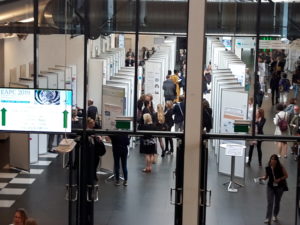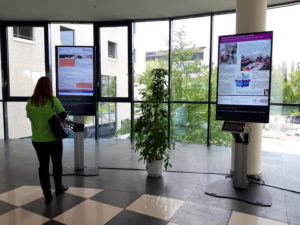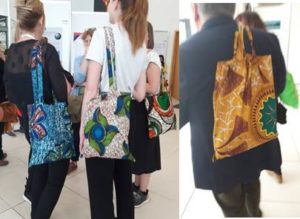
I took over BMC Palliative Care as Editor just the month before the congress and have been particularly excited to network and meet clinicians, caregivers, researchers, volunteers, patient advocates, and educators in this field. After hearing so many positive things about the Palliative Care community I was enthusiastic to learn more about how palliative care fits in the current global health agenda.
The increasing recognition of the importance of palliative care in society is reflected by the growing number of EAPC congress delegates each year, with this year’s event reaching an attendance of 3,000. Among them, particularly the Australian and New Zealand delegates filled the rooms with positivity and even managed to encourage the whole audience to join in their chanting in one of the keynote talks.
“When you are well, you belong to yourself, but when you are sick, you belong to your family.” – Rwandan saying
In the opening ceremony, Prof. Phil Larkin, president of the EAPC, introduced a strong and clear statement – ‘Palliative Care must be part of the global health agenda’, followed by a heartwarming opening concert session performed by the German band ‘Nordlichter’. Welcome to Berlin!
Dr. Sèbastiene Moine, chair of the scientific committee of the EAPC World Congress, reminded us all that five years since the adaption of the Resolution on Palliative Care by the World Health Assembly, the EAPC World Congress in Berlin is perfectly timed. The upcoming days will give us the chance to reflect the progress in the global development of palliative care. For a better integration in care Dr. Moine presented an upgrade version of the ‘EAPC Primary Palliative Care Toolkit’ endorsed by WONCA, the World Organization of Family Doctors, with the words: ’Here is to hoping for the dissemination of the palliative care approach into primary care!’.

The World Congress participants had the chance to take part in various stimulating meeting tracks, seminars, discussion forums, and poster sessions. It was often hard to pick the next one to go to with many interesting sessions and topics in parallel. Fortunately, I managed to attend interesting sessions which all touched the latest challenges in the field, e.g. an increased request of palliative care for prison inmates, the different models and policies of physician assisted dying around the world and palliative care plans for mentally ill patients.
Plenary talks – Is Palliative Care biased?
“It has been easier since Jack died (…) I neglected my own health.” – Female caregiver
The choice of invited speakers was positively excellent; the plenary talks were thought-provoking and motivating. Yet, Prof. Merryn Gott’s presentation, Dr. Katherine Sleeman’s provoking keynote, and Dr. Ntizimira’s journey stood out and persisted in the audience’s mind for a while.
Professor Gott (University Auckland) raised the question if palliative care is gender-biased. She created awareness for a large group of unnoticed women who feel obliged to care for their husbands at home, outside of the radar of hospitals, doctors, hospices, or any help. As a wife, they feel bound by marriage to take care ‘until the end’ and urgently need to be more supported in their burden, physically and mentally.
Dr. Sleeman (Kings College London, UK) strongly reminded us of the importance of well-designed studies and valid research questions to stop the influx of low quality data and to avoid ‘research waste’ that could limit the resources of reviewers and publishers. She highly encouraged us all to increase the value of research, connect and cooperate, and work closely with stake holders to promote the transition from published research to desperately needed real world policies. She did well to remind us all that our mission does not end with our published articles.
Dr. Ntizimira’s presentation on ‘Palliative care for Rohingya refugees in Cox’s Bazar (Bangladesh)’ took us all on a challenging journey and raised awareness for a very vulnerable population. Once again, adequate access to an early, coordinated and continuous palliative care is desperately needed around the world.
Global Challenges in Pediatric Palliative Care
Children’s palliative care is an emerging field with many similarities to adult palliative care but also distinct differences. In Berlin, the EAPC hosted for the very first time, a dedicated pediatric palliative care seminar in the Europe Hall on Thursday 23rd May. The committee managed to compile an interesting program on the latest clinical, ethical and political issues inviting experts in the field. I had the chance to attend the last session on’ Challenges on pediatric palliative care’ and still have goose bumps when I think about it.
“We do as much as we can, as well as we can, for as long as we can, for as many as we can.” – Written note at hospice in Uganda
In contrast to my initial assumptions, the pediatric group most affected in palliative care is children between 0-1 years old. Dr. Eduard Verhagen (University of Groningen) provided insights into the challenges and tools that help parents to make informed decisions during what is likely the most painful time of their lives. Dr. Danai Papadatou (Director of Psychology, University of Athens, Greece) is one of the most popular personas in the field. Her use of theories, concepts, history, and models are well-known and delightful. She manages to convey complex ideas in a manner that is accessible to all and took us on her journey of accompanying children at end of life. She later gave another insightful plenary talk on her work with minor refugees that she has visited in camps throughout Southern Europe in the past years.
EAPC meets ESMO: Integration of Oncology and Palliative Care
The Lancet Oncology commissioned article (Kaasa et al., 2018) and the ESMO (European Society of Medical Oncology) position paper on Supportive and palliative care (Jordan et al., Annals of Oncology 2017) delivered the ideal basis to discuss the growing challenges and interfaces in the area of integration of oncology and palliative care. Delegates were warmly welcome to attend the full day EAPC – ESMO Seminar in the Europe Hall on Friday 24th May. As Editor of BMC Cancer and BMC Palliative Care, I was particularly interested in the special track.
The committee invited great panels and speakers that triggered critical and fruitful discussions on current challenges, latest developments and the place of death. However, there is still so much we need to do to unite the clinical and traditionally grown cancer-focused treatment approaches with early palliative care plans to serve the most important part: the cancer patients and their families.
EAPC Congress ePosters – a complete success

EAPC organizers helped to overcome the well-known conference struggles like presentation scheduling conflicts by installing 3 large monitors and a platform that run all posters as electronic posters throughout the congress. Attendees were able to search via topic, title or author. One even had the feature to email posters – those which received consent by the authors – to attendees to view later. The delegates valued the approach, and the ePoster platform will be part of future EAPC conferences.
Poster Award and EAPC Research Paper of the year 2018
During the final ceremony session Dr. Natalia Arias-Casais’ poster presentation on ‘Consensus building on health indicators to access palliative care global development with an international group of experts’ has been awarded as best reflecting the congress theme. There was a standing ovation when Daniel Gainz-Miranda and his colleagues from SERMAS (Palliative Home Care Team, North Madrid, Spain) were announced as EAPC Research Article of the Year 2018 winners. Many congratulations to both research teams, well deserved.
Photo competition, interactive wall and unique conference bags

The congress committee provided the delegates with some unique meeting features. Participants were invited to take breaks, slow down, and review their own thoughts on dying and palliative care at different areas of the conference site. We were encouraged to write down our dreams and life goals on the ‘Before I die….’ wall. The attempt was more or less taken seriously, and the frequently changing additions helped to put a smile on the face of many passersby – with the most popular ones even hitting the conference’s twitter feeds.
Meanwhile, in the hallway we had the chance to vote on our favorites for the photo competition. Deciding was difficult, with various intimate and touching pictures, yet not too cliché for the field. I am secretly pleased to report one of my favorites won the photo competition award. Congratulations!

One of the most wanted items at the meeting were the unique conference bags. EAPC supported the Kawempe Home Care (KHC), a private not-for-profit, community organization in Uganda and ordered thousands of handmade meeting bags for all the delegates. Each bag was more beautiful than the other and it was hard to spot duplicates throughout the meeting. With the bags being long-lasting, sustainable, and thoughtful, people queued at the very last day to grab leftover bags and seconds for friends and families at home. I fell in love with my bag and will keep it. It has been a gentle reminder of the topics I heard and the conversations I had ever since.
EAPC 2019 it has been a pleasure, I am looking forward to seeing everyone again at EAPC 2020 in Palermo, Italy, next year.
Comments